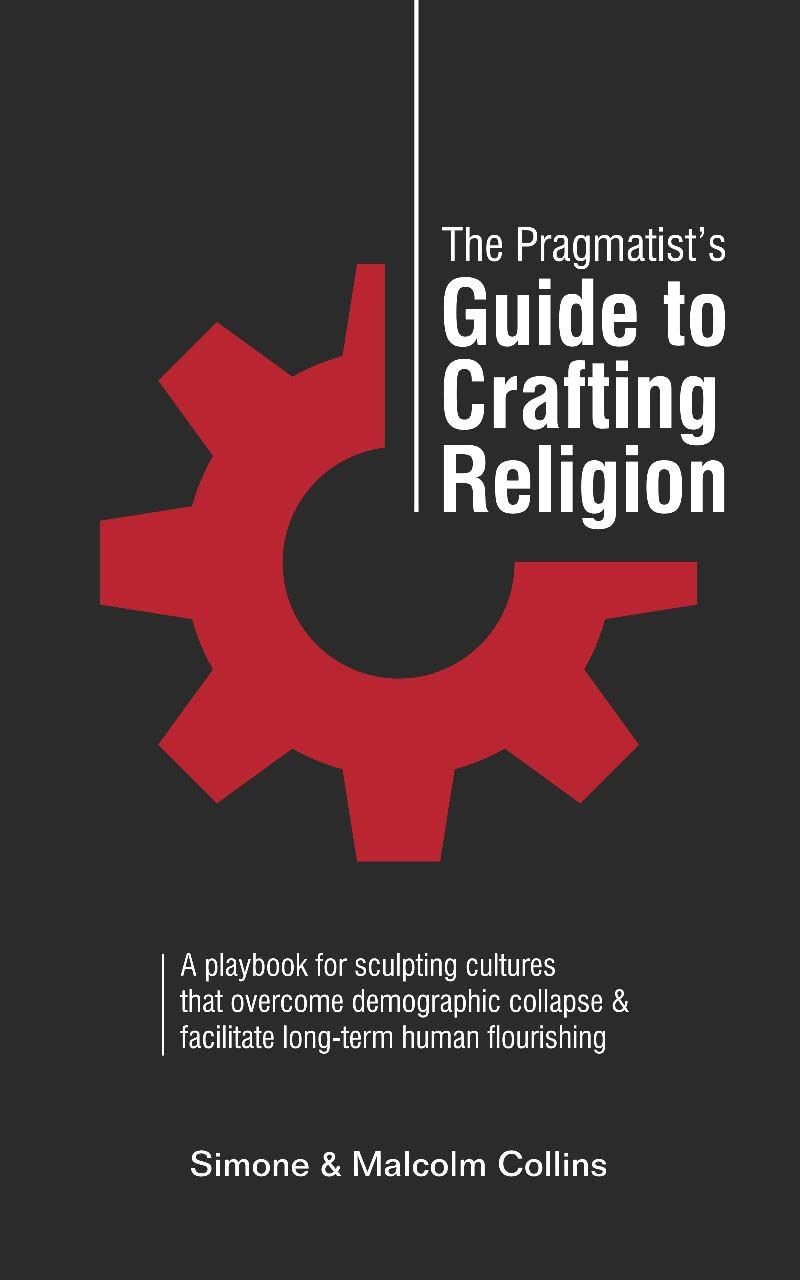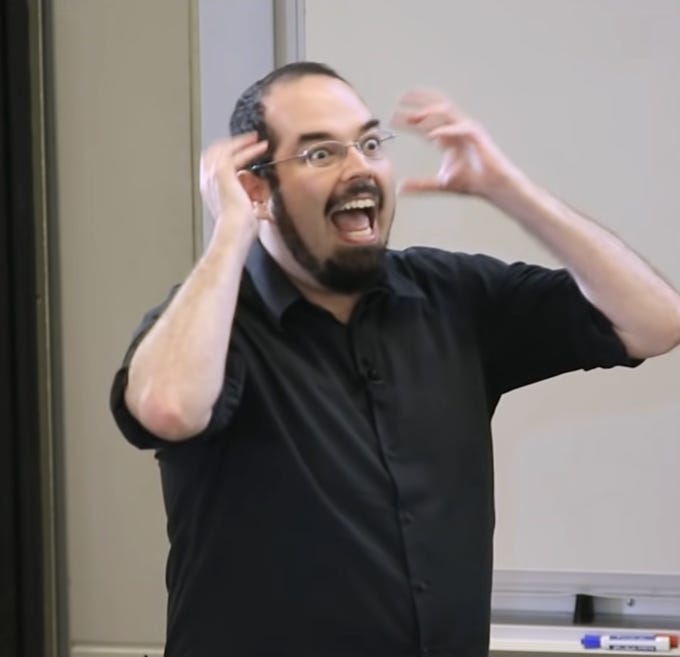Previously:
Preamble
Chapter 1 - The Why (Chapter 1 digressions)
Chapter 2 - Numbers Go Up
Chapter 3A - The Hardness Spectrum (Chapter 3 digressions)
Chapter 3B - Wokeism
[audio available here, courtesy of AskWho]
Chapter 4 - “BELIEF” VS “BELIEF”
Many cultures have “beliefs” that they don’t “Believe." […]
These “beliefs” allow a culture to hold a framing device about the world without having to logically justify it within their wider metaphysical framework of reality
This is a 6-page chapter, but I go on at length because it hits one of my sore spots. In my defense, when I initially read this I winced a bit but suspended judgement. I think there’s a lot of value to trying weird new things, and to acknowledging the strengths of tactics that have been used successfully in the past. With the hindsight of having finished the book, mulling for a few months, and then rereading this chapter, I find myself less inclined to be so accommodating. I want to be fair… but not to give the impression I’ve been convinced of any of this.
Herein the Collinses endorse lying to their children (and to themselves??) by espousing “beliefs” that they don’t actually believe. This is justified because saying you believe something even though you don’t has utility(??)?
For example, we intentionally developed a “belief” that we are protected by “Future Police.” Whenever something seems to have gone wrong, we just tell each other it was the Future Police teaching us a lesson or correcting a sequence of events to solidify a future that must come to pass.
it is easy to explain to a kid why the Future Police have no motivation to protect an individual who lives only for themselves or their immediate community instead of the future of the species and their family. The concept of Future Police can be used to teach kids to constantly consider how their actions impact humanity in both the near and distant future
I have strongly been against lying to children since the first time I realized I was being lied to. It’s one of the major things that drove me out of my religion. I’ve found this to be true amongst most atheists of the rationalist bent. If you want your intelligent children to leave your religion, by all means lie to them. Documenting those lies in a book that will likely be around for many years is especially encouraged. :(
I am against lying to adults too, fwiw. Finding out I was being lied to was one of the major things that drove me away from the progressive left! I’m psychologically and morally built to be very leftwing, do you know how hard you have to work to drive me away? And yet!
The Collinses make a case for the utility of self-deception.
The Future Police emerged first as a psychological technique that I, Malcolm, used to frame negative events in a positive context. I found that I was strictly better off assuming that anytime I was stressing over a negative event, the undesired turn of events was ultimately for the best and I really ought to be studying the event to glean useful lessons and identify meaningful opportunities.
This actually does sound very good. I have at least one strange metaphysical belief that gives me a lot of comfort which I have no evidence for. I may share this with others. I do not present it as reality. I worry about over-focusing on it, because…
It has become harder and harder in our family to disbelieve the Future Police. It feels too improbable to us that mere chance has caused something genuinely good, either for ourselves or others, to ultimately come out of every personal setback or tragedy we’ve suffered. Life strains credulity.
I see this kinda thing happen all the time, even among rationalists! People get into meditating and a few years later they deeply believe the universe itself is conscious and that they can tap into/communicate with that consciousness. This is a known failure mode.
Yes, life strains credulity. That’s a thing you learn very quickly as a fiction writer. You constantly run into things that really happened in real life that you could never, ever write in a fiction narrative because they’re too ridiculous to be believable, and it’s very frustrating! As much as rationalist have internalized that mind-space is incomprehensibly vast, it seems that many haven’t internalized that the possibility-space of “all things that could possibly happen to a human” is incomprehensibly even more vast, and truly nutty things can happen just by chance a fair few times in any given lifetime.
Even if the belief is silly, it seems self-destructive to drop it—so why not lean in?
I believe this was meant rhetorically, but they answer in the very next paragraph:
Moreover, how we frame Future Police has become more “theologically sophisticated” over time, making our belief in them seem less insane given our other assumptions about how the universe works.
Yeah man, this is kinda the problem. This is like the rationalists that have joined Catholicism or Mormonism “just for the community” and two years later they’re convinced their holy book accurately describes a real god acting in real reality. We are running on corrupted hardware. These institutions have had millennia of trial-and-error finding ways to hack our brains. Please don’t go proving yet again that this is easy to do and assuring yourself the short term gains justify the means.
Maybe our God-like descendants exist as something akin to probability waves and manipulate the present to manifest the futures in which they exist. […] Maybe the way to “curry favor” with the Future Police is to have a very strict, predictable, and specific moral code, signaling one’s utility as a useful pawn in their larger plans.
ಠ_ಠ Sure, maybe. And maybe we’re in the Matrix.
All this builds to:
Future Police, as a family tradition, are also useful in conveying more complex concepts exemplifying our Secular Calvinist cultural framework
This is very understandable, and seems to be a common occurrence. Many of the people who are going back to some sort of belief are basically recreating their childhood religions but with a wrapper of plausibility. I don’t blame them for this. Quite a few freely admit that’s what they’re doing, and that this is good actually. Personally I don’t think these traditions will last, because they are essentially LARPing. LARPing is unstable. Pretending to believe always has to resolve into actual belief (delusional) or atheism (where we already are).
A Family Affair
Our personal House’s cultivar features an inversion of ancestral worship: Descendant worship. We believe that our role is to influence and empower our children, youth, and society in a way that empowers future generations to surpass us.
I believe this chapter is the one that first really makes it apparent what the Collinses are documenting in this book. They’re creating a new mythology from scratch to justify and teach Calvinist morality to their children with a few modifications. This is fine! But they introduce a slight of hand here that really disappoints me.
Up until this point, the word cultivar was being used to describe large social phenomena. Religions, cultures, political movements. A fair bit of effort was spent on talking about how humans shape cultures and cultures shape humans over many generations, to the point of steering real genetic changes. Having loaded the word with all that potency, they now use it to describe their “own personal House’s cultivar.” But they do not have a cultivar. They do not have a society of interlocking families and institutions that have shaped history and altered human genes. They have a LARP for their kids, and morals they strongly believe in. That’s not a cultivar, it’s an neat family tradition. It involves religious beliefs, so I would consider it a “family cult” in the traditional sense, not the bad sense! A family cult is a private thing, but it’s not a religion. And crafting a family cult is DRASTICALLY different from crafting a religion.
This is when I first began to suspect I would ultimately be disappointed in this guide.
Anyway, youth worship is the standard in America already, and there isn’t much that the Collinses add to it here. I will say it’s admirable for a society to focus so much on the well-being of their children. I think it’s gone a bit overboard in our nation over the last 50 years.
I don’t think codifying it into literal worship will change much.
Our job is to tend a garden in which the divine germinates and grows. We call this multigenerational entity: Omniscion, the Inevitable God
“Literal worship” was not me being hyperbolic. :)
That’s almost the end, but…
Eliezer Screaming
[Descendant worship] incentivizes alignment with most benevolent AGI (artificial general intelligence), as artificial intelligence is another “cultural successor” of humanity and, as such, is a type of “descendant.” This puts descendant worshippers at lower risk in a scenario in which an AGI decides to kill most—but not all—of humanity






As for Cultivar vs Religion vs Family Cult, I assumed that the Collinses intention was for what is currently a Family Cult to grow into a Cultivar through a combination of organic reproduction above the baseline and intentionally designing the cult so that it is resistant to attrition. Was there something else they promised in a bait and switch that I missed?
I can see why this might be disappointing if you are looking for a Cultivar that can be spread through the current generation rapidly. I got the impression that the Collinses are warry of that kind of rapid growth since it may be prone to overextension and a resultant collapse.
Take this all with a grain of salt since I am getting my entire view of this through the lens of your review/analysis.
I am not sure if it comes across more specifically in the original text, but my first thought on the inverted ancestor worship was that "huh, that could work, as long as the 'target' is beyond the generations you will directly interact with."
Do the Collinses specify anything along those lines?
I would think this could potentially differentiate it from standard American youth worship, but I haven't noodled on it enough to pinpoint its specific failings.